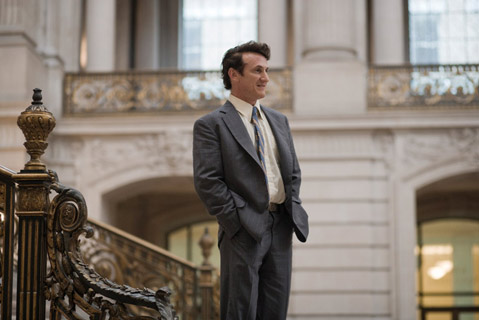Our Gay Girl Watches Milk
Crying in the Happy Parts

It was the happy part of the movie the part where good triumphed over evil, where reason prevailed. And yet I was crying tears of sadness, slumped in my chair in the movie theater in what has become a familiar feeling of defeat. This is the physical pose I’ve wanted to take for weeks since the election, since Proposition 8 passed in November, but I’ve managed to keep my chin up. Yet here I was, during the only truly happy moment of the recently released Milk, crying like there was no tomorrow.
In a not-so-ironic twist of fate, the proposition on the ballot in 1978 was Prop. 6, and it attempted to ban gays and lesbians-and anyone who supported gay rights-from working in California’s public schools. The defeat of Prop. 6 indicated a major shift in the gay rights movement, and the campaign saw more homosexuals come out to their friends and family and jumpstarted the organization of the Log Cabin Republicans. It was difficult not to contemplate the similarities between the campaigns and consequences of 1978’s Prop. 6 and 2008’s Prop. 8, and, by the end of Milk, it was even more difficult not to wish we had been celebrating a similar victory on a much more recent Election Day.
Milk is a beautiful film, wonderfully shot with brilliant actors (Sean Penn, James Franco, and Emile Hirsch were particularly amazing) and a well-timed voice-over by the lead actor. The story is lovingly told by screenwriter Dustin Lance Black , who clearly researched his subject exhaustively. And even though my girlfriend and I really loved the film and could come up with lots of reasons why it spoke to us, I had to wonder if my affinity to it was because I’m gay and fancy myself somewhat of an activist. Would this film move me if I were a heterosexual, middle-of-the-road person?
I’d like to think so. I’d like to think that the subject matter of Milk is so universal that it speaks to the human need to love, the common desire to fight for one’s beliefs and rights. But that’s also what I thought about the fight against Prop. 8. If this film teaches us anything, it’s that we need to learn how to fight better against a very organized and mobilized religious-right movement; the arguments made against gay people in Milk are eerily similar to the arguments made this year. In the 30 years since Harvey Milk’s election and assassination, California has come so far, and yet we still have so far to go. I think Harvey would be pleased with our progress, but astounded with our stagnation.
The inevitable question theatergoers are presented with after leaving Milk is: Who will take up the cause-who will be the next Harvey Milk? Cheesy as it may sound, I think the spirit of Harvey Milk has to come from within each of us. Harvey clearly had an unquenchable desire to fight for freedom and equality for everyone. I think the desire for freedom and equal rights exists in all of us; the question is, who is willing to fight for it? The fight against Proposition 8 may be over in the ballot box, but the spark of activism it has created will be felt for many years. I truly believe it has inspired a generation of Harvey Milks.
And I think even Harvey would agree that the setback of losing Prop. 8 is worth renewing the fight against discrimination.



